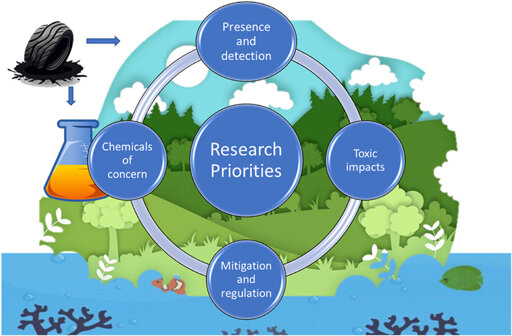A new study led by an international team of scientists highlights tire particles (TPs) as the leading contributor to microplastics and calls for urgent, targeted research to address their unique environmental and health risks.
Accounting for nearly one-third of all microplastics,

Reducing the size and weight of a car goes a long way for environmental impact. People seem to think it’s just less fuel being burned.
In reality, there is a reduction of almost every consumable. Smaller tyres. Less tyre wear. Less brake dust. Less oil used. Less chemicals when washing. Less wear on the road surface. Less manufacturing emissions. Less disposal when it’s done.
The relationship isn’t linear either. Doubling the weight of the car results in about 10x the surface wear.
I like to remind people of these things when they have a massive SUV but claim it is “good for the planet” just because it is electric.
No car is good for the planet. Some are better than others but they are all bad and destructive compared to nearly any alternative mode of transportation.
This reminds me of those solar cars. https://wonderfulengineering.com/family-solar-car-stella-runs-completely-on-solar-energy/
But EVs are supposed to solve everything!
Edit for the downvoters: I’m not against EVs as a replacement for ICE, but they’re not an endgame solution. We need to reduce the number of cars, period, whether they’re ICE or not.
Nope! Instead, they save car industry profits!
Why would you want for electric vehicles to replace Inter City Express trains?
It’s an abomination unto the Lord
-Leviticus 3:10 to Yuma
Evs are better than ICE but just changing every car to an EV is not a solution and will solve very little, it only really helps with the energy parts of the problem. It doesn’t even address the amount of land we waste and pave for cars. People call me anti EV and a “climate change” denier whenever I talk about how EVs are not a good solution, despite me having gone to school for environmental technology and being far more knowledgeable on climate change and other environmental destructions.
The industry has really tricked most people into thinking the tail pipe is the only issue with a car. The EV isn’t here to save the planet, it is here to save the car industry.
I would also much prefer transit and walkability. I do miss the freedom and convenience of walking out my door and just going anywhere, from when I lived downtown. People trapped in their cars can never understand how badly they’re compromising.
However now that I live in a place requiring a car to goto work or the grocery, I’ll make do with an EV until transit exists …. Not holding my breath
Anyone want to team up to start up an organic tire manufacturer with all natural rubber tires?
You have to vulcanize it to make it usable. That also makes it not degrade in the environment.
Cars won’t be gotten rid of entirely. But we can reduce their usage. Rideshare systems (non-evil ones, not just Uber/Lyft; a membership system has been tried in Europe and works well) could help reduce the need for cars.
No
Please provide reasoning
Cars and car infrastructure are very expensive. I see that as a growing problem, with resources (budgets) needing to be allocated to more important things.
If you keep “a few” cars, the policy transforms cars into highly desirable status signals due to being luxury products that have some large access privilege. This alone is a huge danger because people in this civilization are raised to be obsessed with chasing status and giving a small minority the huge advantage of cars and car system would probably lead to some type of mafia, political corruption, all kinds of bad shit. And it would maintain DESIRE for cars, and desire is key to creating demand.
The goal should be to eradicate the technology of cars entirely. That’s going to allow for more efficient use of other systems, more efficient use of resources, less pollution, way less class conflict.
I’m not saying that it will eliminate class conflict, because we know that there’s a history of “classes” in public transportation, even in buses. That’s segregation by class (in the US that class system was also mirrored in “race”). That’s a problem we should figure out separately.
Essentially, any time you support the production and use of a luxury, you’re destabilizing society and creating dangerous racing conditions (“race to the bottom”, “rat race”, “arms race”) which means that it’s unsustainable socially and politically.
I am actually from Eastern Europe and in my country, during the “Socialist” regime, there still were cars and they were rare. It drove the people nuts, it was a huge privilege to drive on, to buy one, to fuel one. After 1989 getting cars became a free for all, if you had money, so now the place is almost literally paved with cars in the big cities and most of them are second-hand, with a large number of them being junkers that cause horrible pollution (yes, we are in the EU). I’ve seen it happen, this tragedy. Which is why I say that there can be no stable state of “just a few cars”.
It doesn’t even work industrially, these car factories and car parts factories rely on economies of scale and large production. The lower the production, the more expensive and manual it has to get. Remember, cars started out as a rich people’s dangerous toys.
Similar dynamics apply to car infrastructure. That shit’s expensive. Do you think you’re going to have highways across the land for a fraction of the current car users?
We can’t house everyone on earth in adequate accommodations lol
I doubt plebs will be riding on latex tires any time soon
If only we had the technology to put cars on metal tracks, oh and we could add power lines so that electric cars wouldn’t need batteries. Hmm, next we could link the cars together so that only the first car has to overcome wind resistance
These news are becoming tiresome
Well now I feel responsible for that because I ride a bicycle
A couple months back there was an article claiming that filtering at road drainage had a significant impact on tire particles. We may be able to do something about this pollution!
Wonder what environmental impact of trains is. I assume there must be some.
If we’re just looking at the grinding of the metal wheels against the rails, it’s very little. Some metallic particles are produced in the normal wear but ferrous metals easily react and oxidize into more inert and normal forms for life.
Anything modern human does will have “carbon footprint” as corpos like to say it. But a lot of it is outside of person level control.
Just picking your poison to be less toxic. Still worth it but it ain’t the final solution, just a better one
The trick with the train is there is less impact per person serviced compared to the car. Trains are also more fair to more people and can be way faster when built correctly. Rails also have significantly less friction compared to tires and roads. Trains are also safer as conflict points are more controlled among other things.
I wonder if traction control and antilock braking make a noticeable difference, and how that compares to weight?
For example my EV is a bit heavier than my previous ICE car and has much better acceleration, both of which increase tire wear. However with individual all wheel drive, traction control and antilock braking, I should never see any skidding behavior where you’d expect the most tire wear. Is it enough to make up for the increased weigh? No idea
and regenerative braking





